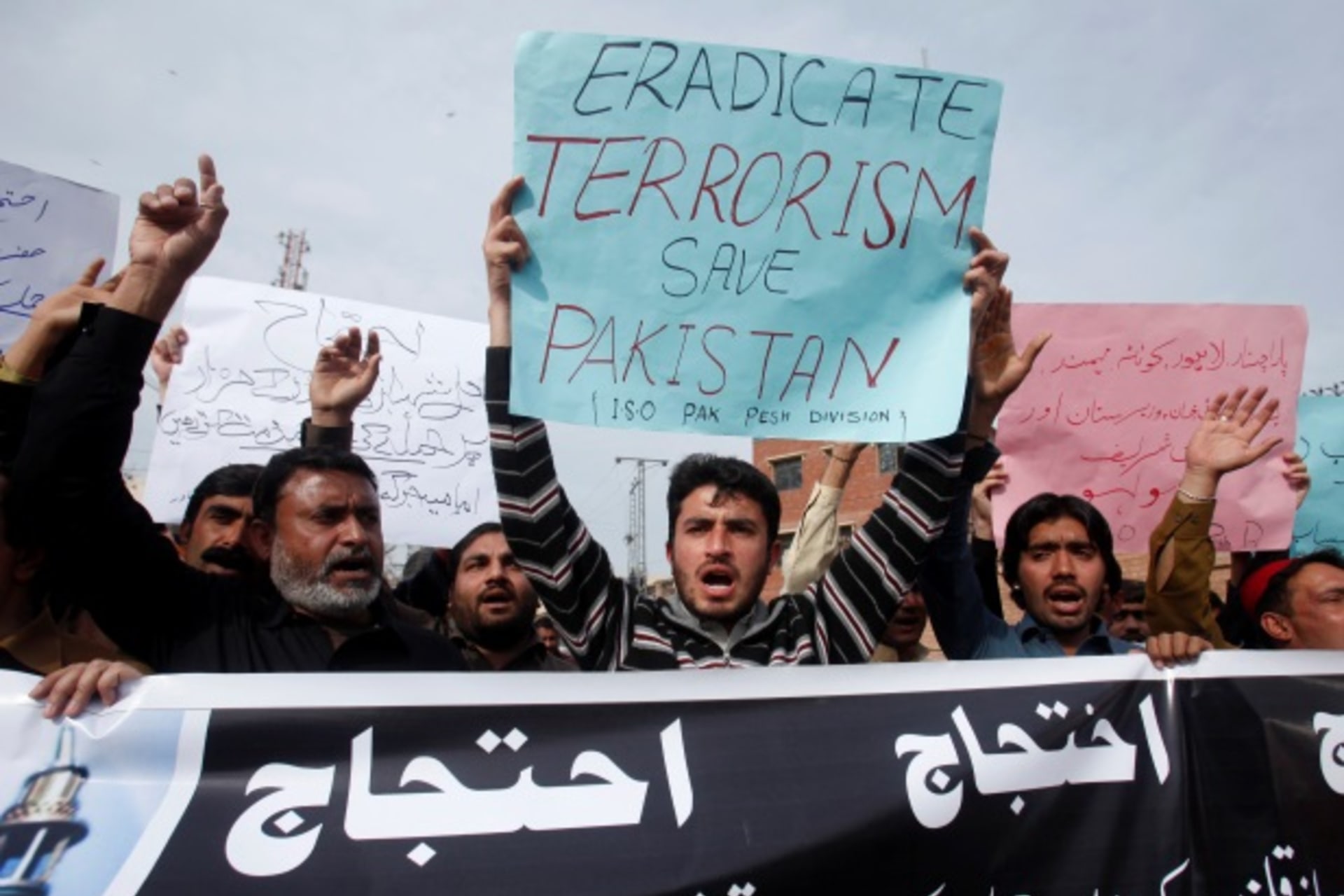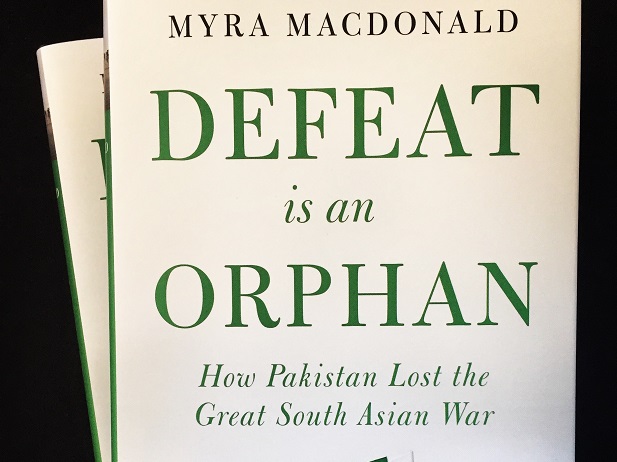Pakistan: Defeat Is an Orphan

By experts and staff
- Published
Experts
![]() By Alyssa AyresAdjunct Senior Fellow for India, Pakistan, and South Asia
By Alyssa AyresAdjunct Senior Fellow for India, Pakistan, and South Asia
1. You have structured this as an account of multiple defeats in what you term “the Great South Asian War.” Some of these defeats are tactical, such as with the India-Pakistan peace talks, or the Kargil War, but it becomes clear by the end of your book that you mean this as a larger metaphor for a “Great War” that only exists in the minds of Islamabad and Rawalpindi. Pakistan is “blinded,” as you say, to how the world has changed around it. How did you come to see so many episodes—of terrorism, of failed peace talks, the military standoff in 2001–02—as moments in this larger story of a profound defeat?
There were two questions here that needed to be untangled. The first is about how well the Pakistani state serves its citizens relative to India. The second is about the domestic power struggle within Pakistan. Since the military has successfully retained its political and economic preeminence within Pakistan, how much does it matter that Pakistan’s external position relative to India has declined? I tried to find yardsticks to assess both: historically, what assumptions were made about how well the Pakistani state would serve its citizens, and what expectations did the Pakistan Army have of the policies it followed?
On the first question about the Pakistani state, you have to go back to Partition to set benchmarks about how it was expected to perform relative to India. Implicit in the creation of Pakistan was an assumption Muslims would be safer in a separate country. There was also an expectation that a country run along Islamic principles of social justice would be fairer than one dominated by the Hindu caste system. Those assumptions took a serious hit in 1971 with East Pakistan breaking away to form Bangladesh. But even after 1971, Pakistan was able to retain a sense of superiority over India – its economy continued to perform much better than the Indian state-planned economy. It is only very recently that India began to emerge as a rising economic power. In terms of Indian GDP per capita, this rose above that of Pakistan only in 2009. Such is India’s current trajectory that we can now argue its success relative to Pakistan is irreversible. Thus by the standards Pakistan set itself at Partition—that its citizens would be better off in a separate country, or at least as well off as those in India—the Pakistani state has failed. Not only is it unable to offer its citizens the same promise of economic development, it can’t even offer them security.
On the second question about the fortunes of the Pakistan Army within Pakistan’s domestic power struggle, it’s certainly true that the military has come out on top both politically and economically. But I’d argue that the Pakistan Army has fallen well short of its own expectations. This is particularly striking if you look at the period since the nuclear tests in 1998. Among the army’s assumptions at the time were that it would continue to be able to influence events in Kashmir and Afghanistan while managing Islamist militants well enough to keep them from turning on Pakistan. In 1998, Pakistan could still appeal to those Kashmiris who wanted to break away from India, while it dominated Afghanistan through the Taliban. Nowadays, Pakistan is too near to becoming a failing state to act as a magnet to Kashmiris and it is hated in Afghanistan for its role in supporting the Taliban. It has lost control of a sizeable number of jihadis who have turned on the Pakistani state. As such, I don’t subscribe to the argument that the Pakistan Army is a rational actor that has manipulated rivalry with India in order to maintain its own domestic dominance. In numerous episodes, from Kargil to Mumbai, it has suffered from such overreach and miscalculation that it has failed to meet the strategic aims it set for itself.
2. You situate Pakistan, with its sights set on India, as a supporter of jihadists that ultimately grow out of the Inter-Services Intelligence’s immediate control, and whose jihad itself globalizes to open up new fronts. (I had not known of al Qaeda in Iraq founder Abu Musab al-Zarqawi’s time as a jihadi in Afghanistan, for example, or the links between North African terrorists and the assassination of Northern Alliance’s Ahmed Shah Massoud.) Why has it been so hard for Pakistan to change direction on this policy of supporting violent jihad?
The question of how far Pakistan controls jihadis is subject to an intense debate that will run and run. I disagree with those who imagine the existence of an “on-off switch” that the Pakistani state just needs to flick in order to end the problem of jihadi violence. The different jihadi groups operate along a continuum with some supported by the Pakistani state, some potentially subject to its influence, and others well beyond its purview. Too much thinking is still stuck in the era of the anti-Soviet jihad in Afghanistan, leading to an assumption that anywhere Islamist militants are active, they must have deliberate state support. But the global jihadi movement has been out of control for years, at least since the 1990s when it flourished in the cracks opened up by the end of the Cold War.
Pakistan’s inability to change direction on jihadis stems from several factors. The first is its unwillingness to give up Islamist militants that can be used to counter India, whether in Kashmir or Afghanistan, The second comes from the factor mentioned above – that jihadis are impossible to control fully. The Pakistan Army says it fears that if it turns against all Islamist militant groups at once, they might join forces in a coalition that will threaten the Pakistani state. This fear is partly legitimate, though it also acts as a cover for ongoing support for anti-India groups. It is quite hard to tell where the line lies in Pakistan between unwillingness to disarm militants and inability to tackle them all. I fear that the army itself doesn’t know for sure. This brings me to my third point, which I find the most worrying. The multiple players who make up the Deep State in Pakistan have constructed an ideological environment in which jihadis flourish. The Pakistan Army can manipulate some of these players or deploy them for its own purposes. But I am not convinced it knows how to drain the ideological swamp since that would require a complete rethink of how it defines Pakistan as a state. In other words, even if the willingness to disarm all militants were there, the Pakistan Army doesn’t have the imaginative capacity to know how to get underneath the problem.
3. In a particularly poignant chapter looking at Pakistan’s relations with the Federally Administered Tribal Areas, you observe that Pakistan had “overstated an external threat while underplaying its self-created domestic problems,” leading to the alienation of so many ethnic groups within the country itself. Is it possible, in your view, for Pakistan to rebuild itself domestically if it does not abandon its external focus?
It’s going to be extremely difficult for Pakistan to rebuild itself domestically. Rather like the frog in water that is boiled slowly so that it doesn’t jump out, Pakistan has deteriorated relatively gradually on multiple measures from economics to development to security to international standing. The likeliest outlook is that the situation in Pakistan never becomes so bad that it is forced into a paradigm shift, even as it continues to offer less and less to its citizens. On the domestic front, the status quo still benefits enough people, both in the armed forces and among the elite, for them to resist changes that would threaten their own privileges. In an ideal scenario, the democratic process will be allowed to mature to the point that ordinary citizens begin to demand more from the state. But I don’t see that happening for a long time and the country probably needs new political leaders to help it along.
We’ll also have to see what happens now that China’s influence is growing in Pakistan with its investment in the China-Pakistan Economic Corridor. In the past, China has been impatient with Pakistani adventurism against India and it has no ideological sympathy for jihadis. But nor does it have much interest in nurturing democracy.

4. Near the end of the book, you make the case that Pakistan’s attempts to “wrest control of the Kashmir Valley had come to nothing….it had sacrificed the interests of its citizens while propping up an overly powerful army and spawning a dangerous collection of jihadis on home soil. The nuclear weapons it had believed would prevent the Valley slipping out of its grasp had instead encouraged a recklessness that drove a Kashmir settlement permanently out of reach.” What, if anything, could lead Pakistan to stop this recklessness and focus on the domestic needs of its own citizens, usually the most important obligation for a state?
I’d love to see more critical thinking from the Pakistani elite that focuses on the needs of the country’s citizens. As long as Pakistan styles itself as a champion of the global ummah, you’ll still end up seeing more outrage about, for example, Israel’s behavior towards Palestinians or India’s treatment of Kashmiris, than about human rights abuses and poverty within Pakistan itself. The country also desperately needs to rewrite its school textbooks which currently stress a hyper-nationalist and anti-Hindu view of history. In an ideal world, the media should also be contributing towards a more nuanced understanding of the origins of the Kashmir dispute. I’ve argued in my book that Jammu and Kashmir has been badly served by both India and Pakistan. But given the importance accorded to Kashmir in Pakistan, it’s disappointing that the media continues to parrot a simplistic Pakistani state line that dates back to 1947. As I have argued in the book, no solution on Kashmir is possible, if ever, until Pakistani society is prepared for the possibility of compromise.
5. Washington comes in for some tough criticism in your book—as a “damaging foreign entanglement” for Pakistan during the Cold War, and also as a naïve power willing to believe that General Pervez Musharraf was a bulwark against Islamists all while he undermined secular politics. What would you recommend to Washington policymakers as an alternative approach?
There’s no magic bullet. If the carrots and sticks of the past 16 years or so failed to convince Pakistan to change course, nothing will. Nor is there any obvious punitive action that can bring Pakistan to its senses. Don’t forget this is a country that was cut in two in 1971 and responded by becoming more nationalist and developing nuclear weapons. In the recent period, it has been willing to countenance the deaths of thousands of its own citizens in pursuit of its “good Taliban/bad Taliban” policies. India needs to learn this lesson too – if the United States with all its economic and military muscle couldn’t force Pakistan to change, nothing Delhi does will make much difference either.
The best the United States can do is to stop expecting Pakistan to change and be realistic. It should not imagine that if it makes itself vulnerable to Pakistani influence, for example by sending more troops to Afghanistan who need to be supplied through Pakistan, that it can expect a different outcome from the one it has seen since 2001. I’m not in favour of cutting aid to Pakistan altogether. Washington needs to maintain just enough aid to retain some influence in the country. It is also going to have to work with China on Pakistan, regardless of tensions between Beijing and Washington elsewhere. Finally, the United States could be less mealy-mouthed about calling out Pakistani support for Islamist militants. The diplomatic cover Washington has given Pakistan since 2001—rarely saying in public what it says in private about Pakistani support for jihadis—has only alienated allies in Afghanistan and India and fed confusion among the Pakistani public.
Follow me on Twitter: @AyresAlyssa. Or like me on Facebook (fb.me/ayresalyssa) or Instagram (instagr.am/ayresalyssa).
